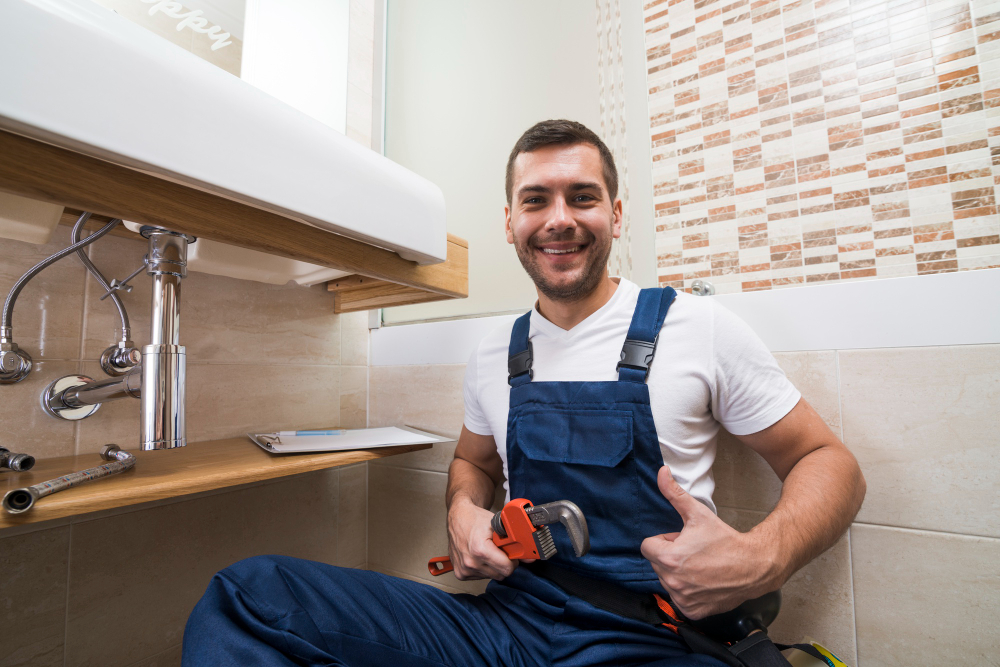Minor plumbing issues like a leaky faucet or a clogged drain can often be handled with simple tools and a bit of DIY know-how. However, more complex problems can quickly turn into costly mistakes without the right expertise. Knowing when to handle a plumbing issue yourself and when to call in a professional can save you time, money, and potential headaches. Here’s a guide to help you decide.
When to DIY: Common Plumbing Fixes You Can Handle
1. Unclogging a Sink or Shower Drain
- Why It’s DIY-Friendly: Most clogs are caused by hair, soap buildup, or minor debris and can be handled with basic tools.
- Tools Needed: Plunger, drain snake, baking soda, and vinegar.
- How to Do It: Try using a plunger first. For tougher clogs, a drain snake or a baking soda and vinegar mixture can usually clear out the blockage.
- When to Call a Pro: If the clog persists or if you notice multiple drains backing up simultaneously, it could indicate a deeper issue in the main sewer line.
2. Fixing a Leaky Faucet
- Why It’s DIY-Friendly: Leaky faucets are often due to worn-out washers or O-rings that can be easily replaced.
- Tools Needed: Wrench, screwdriver, replacement washers/O-rings.
- How to Do It: Shut off the water supply, disassemble the faucet, replace the worn-out parts, and reassemble.
- When to Call a Pro: If the leak continues after replacing parts or if you encounter unusual components, consult a plumber.
3. Replacing Showerheads and Faucet Fixtures
- Why It’s DIY-Friendly: Swapping out old fixtures is a simple process that requires basic tools.
- Tools Needed: Adjustable wrench, plumber’s tape.
- How to Do It: Remove the old fixture, apply plumber’s tape to threads, and install the new fixture.
- When to Call a Pro: If you encounter rust, corroded parts, or notice a leak in the wall behind the fixture, it’s best to get professional help.
4. Adjusting Water Pressure
- Why It’s DIY-Friendly: Many times, low water pressure is due to sediment buildup in faucets or showerheads.
- Tools Needed: Wrench, vinegar, or descaling cleaner.
- How to Do It: Soak the aerator or showerhead in vinegar to remove sediment and clean thoroughly.
- When to Call a Pro: If low water pressure is affecting multiple faucets or if cleaning doesn’t help, it may indicate a larger issue with the main water line or pipes.
When to Call a Pro: Complex Plumbing Repairs
1. Repairing or Replacing Pipes
- Why You Need a Pro: Replacing pipes involves cutting, soldering, and securing connections, which can be dangerous and complex without experience.
- Risks of DIY: Improperly installed pipes can lead to leaks, water damage, and extensive repairs.
- Professional Solution: A licensed plumber will have the skills to install and secure pipes correctly, ensuring durability and compliance with local codes.
2. Water Heater Issues
- Why You Need a Pro: Water heaters are complex appliances, and incorrect repairs can be hazardous, especially in gas-powered models.
- Risks of DIY: Risk of electrical shock, gas leaks, or water damage if not handled correctly.
- Professional Solution: A plumber can diagnose issues, repair faulty parts, or recommend a replacement for an aging unit.
3. Sewer Line Problems
- Why You Need a Pro: Sewer lines require specialized equipment for inspection and repair.
- Risks of DIY: Trying to fix a sewer line on your own can lead to exposure to harmful waste and potential health risks.
- Professional Solution: A plumber can use advanced tools like cameras to inspect the line and resolve issues like tree root infiltration or blockages.
4. Bathroom or Kitchen Remodels
- Why You Need a Pro: Moving or installing plumbing fixtures during a remodel requires knowledge of local building codes and precise pipe installation.
- Risks of DIY: Incorrect installations can lead to leaks, water damage, and expensive rework down the line.
- Professional Solution: A professional plumber will ensure the remodel is up to code and your plumbing is properly installed to prevent future issues.
5. Burst Pipes or Major Leaks
- Why You Need a Pro: Burst pipes or major leaks require immediate attention and expertise to avoid further damage.
- Risks of DIY: Temporary fixes can fail quickly, leading to extensive water damage and even mold growth.
- Professional Solution: A plumber can replace or repair burst pipes and provide a long-term solution.
Questions to Ask a Plumber Before Hiring
If you’re leaning towards hiring a professional, it’s essential to make sure you’re choosing the right plumber. Here are some questions to ask:
- Are You Licensed and Insured?
- This ensures the plumber meets professional standards and that you’re protected in case of accidents.
- What’s Your Experience with This Type of Repair?
- Plumbers often specialize in specific types of repairs, so ensure they have experience with your particular issue.
- Can You Provide an Estimate?
- A reputable plumber should be able to provide an estimate after evaluating the issue.
- Do You Offer a Warranty?
- Many professionals offer a warranty on their work, which protects you if the repair fails.
- When Can You Start, and How Long Will the Repair Take?
- This helps you plan and set expectations for the repair timeline.
Conclusion
Knowing when to tackle plumbing issues on your own and when to call a professional can save you from costly repairs and extensive water damage. While minor issues can often be resolved with simple DIY techniques, complex repairs are best left to licensed plumbers who bring expertise and tools to the job. With this guide, you’ll be equipped to make the best decision for your home’s plumbing needs, ensuring safety, efficiency, and peace of mind.


